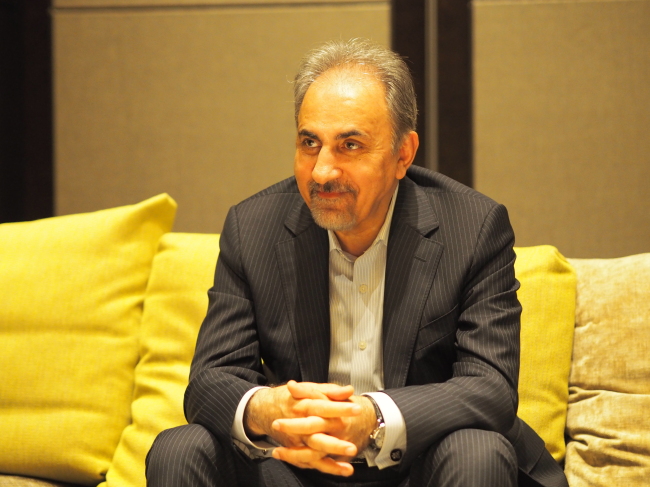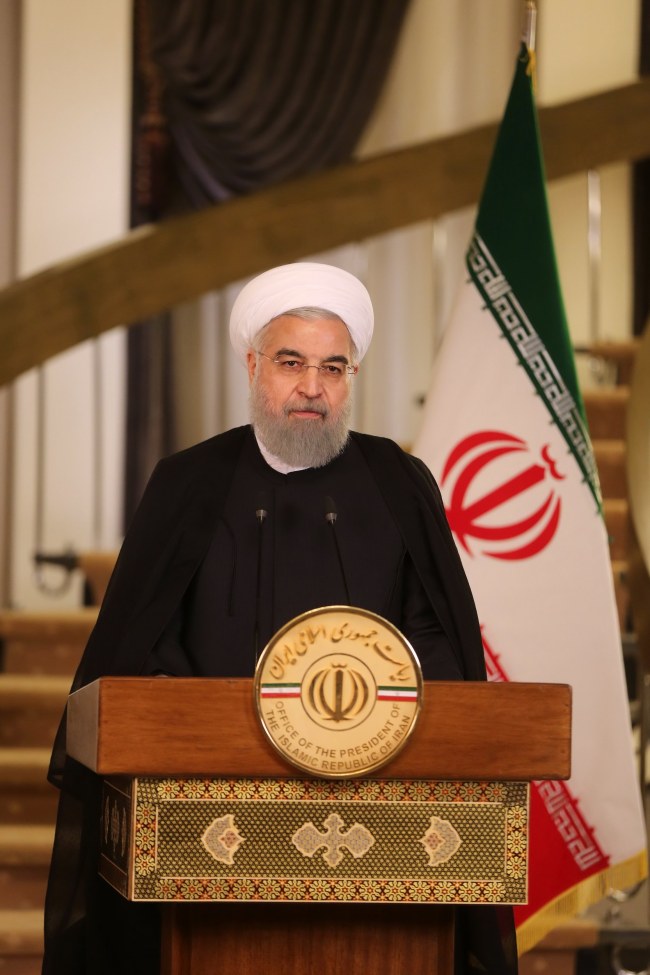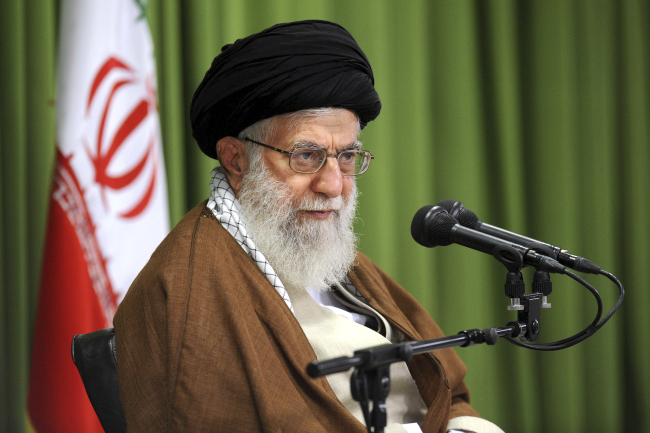In Iran, where hard-line conservatives feel emboldened to have more say over statecraft these days, Tehran Mayor Mohammad-Ali Najafi has been a time-tested defender of globalization and market-oriented reform.
At a time when nation-states are mired in ideological infighting and hegemonic rivalries, Tehran and Seoul -- by relying on civic passion, corporate investment and public goods -- can together contribute to international peace, prosperity and sustainable development, Najafi said during his visit to Korea last week.
“The world is moving in a direction where cities and regions will increasingly play greater roles, replacing the functions of nation-states,” the mayor told The Korea Herald in an exclusive interview at Conrad Seoul on Friday.
“The changes will not be speedy, but steady and piecemeal. But I am confident that cities will be the ones making long-term strategic decisions and luring investments toward sustainable development, not only on the national scale, but global scale.”
 |
Tehran Mayor Mohammad-Ali Najafi, one of Iran’s staunch advocates of global engagement and domestic reform, says the Iranian capital presents untested opportunities to Korean investors. (Joel Lee/The Korea Herald) |
Najafi came to Korea last week to participate in the third meeting of the Champion Mayors for Inclusive Growth organized by the Organization for Economic Cooperation and Development, C40 Cities Climate Leadership Group and Seoul Metropolitan Government. Following the third meeting, he took part in the Seoul Mayors’ Forum on Climate Change, organized by the International Council for Local Environmental Initiatives, Seoul Metropolitan Government and Global Covenant of Mayors.
Stressing that today’s world faces many grave challenges, most fundamentally climate change, the mayor said he critically addressed issues of curbing global warming and promoting inclusive growth, aimed at empowering all people economically, at the two forums from Wednesday through Friday. He reiterated his point that cities and mayors are poised to play an ever-larger constructive role in mitigating these manmade predicaments, a view passionately echoed by leading urban scholars.
The scholar-turned-politician assumed office on Aug. 27 in the government of Iranian President Hassan Rouhani. He has a track record of reformist views urging Iran’s engagement with the world at large, even as the Middle East powerhouse remains deeply divided over its relationship with the United States, which has threatened to annul the 2015 Iran nuclear deal under President Donald Trump, to the detriment of outside investors.
The multilateral accord, formally known as the Joint Comprehensive Plan of Action, was reached in Vienna in July 2015 between Iran and the “P5+1” governments of China, France, Russia, the United Kingdom, United States and Germany, as well as the European Union, to eliminate Iran’s stockpile of medium-enriched uranium, scrap its stockpile of low-enriched uranium by 98 percent and reduce by about two-thirds the number of its gas centrifuges for 13 years.
 |
A handout picture provided by the office of Iranian President Hassan Rouhani on October 13, 2017 shows him speaking on Iranian state TV Broadcast in reaction to a speech by US President. US President Donald Trump's speech in which he outlined an aggressive new strategy against Iran shows that he is "more than ever against the Iranian people", President Hassan Rouhani said. (AFP PHOTO / IRANIAN PRESIDENCY) |
Against this backdrop, Najafi stated, “There will be major changes under my mayorship.”
The 65-year-old native of Tehran added his city now has a reformist administration, marking a sea change after 14 years of the previous administration, and that he maintains “a very close relationship and coordinated policy responses” with President Rouhani, also a reformist with moderate centrist views who has sought to integrate Iran into the global economy. Rouhani won re-election on May 19 on promises of enhancing civil rights and restoring the economy and relations with Western nations.
“Since taking my office in August, I have been a member of the cabinet as well and participate in important government meetings,” Najafi stressed. “This means that there is close policy coordination between the national and municipal governments and any differences are resolved through rational discussions. The people of Tehran expect fundamental changes in the city’s governance and ways of life.”
Tehran, with a population of 15 million in its metropolitan area, suffers from air pollution, lack of infrastructure and overreliance on cars that run on gasoline engines.
Najafi said his key vision for Tehran is to bolster exchanges and contacts with leading cities of the world in finance, entrepreneurship, manufacturing and renewable energy, so that the underinvested capital can lure large-scale investments and professionals for industrial diversification in a post-oil economy.
Over 100 large-scale projects are being planned for foreign investors, he highlighted, encouraging Korean companies to plow capital into knowledge-based industries, as well as construction, industrial and car manufacturing, electric battery production, air pollution control and waste recycling into energy and fertilizer.
 |
In this photo released by an official website of the office of the Iranian supreme leader, Supreme Leader Ayatollah Ali Khamenei speaks at a meeting in Tehran, Iran, Wednesday, Oct. 18, 2017. Khamenei on Wednesday urged Europe to do more to back the 2015 nuclear deal after President Donald Trump refused to re-certify the pact and European companies have rushed into the Iranian markets since the landmark accord. (Office of the Iranian Supreme Leader via AP) |
Of particular importance, constructing and expanding the Tehran Metro subway hold much potential, he said, citing the need for expertise in mechanical components, electronic equipment and software.
The government of Tehran offers municipal guarantees for returns to investment, just as the central government provides sovereign guarantees to investors. Iran has secured a line of credit of 8 billion euros ($9.4 billion) from the Korea Eximbank since August, the country’s biggest loan since the nuclear deal that will finance Korean firms’ projects in Iran.
“Over the last four years since the launch of the Rouhani administration in August 2013, many effective programs and initiatives for supporting small and medium-sized enterprises have materialized,” explained Najafi, adding he, too, pays keen attention to the issue.
“Knowledge-based SMEs have expanded as a result in Tehran. My administration has identified zones for attracting knowledge-intensive companies, modeling ‘Station F’ in France,” he added, referring to the world’s biggest startup incubator in Paris. Refashioned from an old train station, the venture ecosystem covering 34,000 square meters has capacity for more than 3,000 startups, eight event spaces, 30 shower stalls, 60 meeting rooms and 100 shared apartments for entrepreneurs.
Najafi underlined that Tehran -- the main industries of which include the manufacturing of automobiles, electronics, electrical equipment, textiles, sugar, cement and chemical products, alongside government jobs, labor-intensive services and management of oil refineries -- aims to replicate France’s experience to nurture and protect the growth of its SMEs.
Provisions of facilities, reductions in payments of expenses, local tax deductions and other related incentives are offered.
 |
Tehran Mayor Mohammad-Ali Najafi, one of Iran’s staunch advocates of global engagement and domestic reform, says the Iranian capital presents untested opportunities to Korean investors. (Yonhap) |
Prior to his current position, Najafi was the minister of higher education from 1981-84, minister of education from 1989-97 and vice president of Iran Head of Cultural Heritage and Tourism Organization from 2013-14. He was educated at the Massachusetts Institute of Technology, where he obtained his master’s degree in mathematics, but couldn’t complete his doctorate due to the 1979 Iranian revolution. Upon returning to Iran, he taught mathematics at Sharif University of Technology as a professor from 1979-81.
One of Najafi’s priorities is increasing the transparency of municipal administration.
“We encourage people to take part in various activities and management of the city, as well as voicing their opinions on its budget and expenses. We will try to put forward a more balanced and fair budget for the overall benefit of our citizens,” the mayor said.
On the question of an ideological split in Iran, intensified by saber-rattling rhetoric from Washington, he said conservatives and reformists have no differing views over the basics of the 1979 revolution -- where the Pahlavi dynasty was overthrown and replaced by an Islamic Republic -- or the principles of the Islamic Republic. Differences lie in the level of international engagement and the state’s reach over civil society, according to Najafi.
“We reformists strive to develop comprehensive, far-arching relations with the international community, while removing limits on the civil society and various cultural practices. This is absent among the conservatives,” the mayor said. “We believe the key to shared growth and peace is by keeping the door open to all parties of the world.”
By Joel Lee (
joel@heraldcorp.com)











